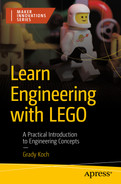LEGO Mindstorms and SPIKE Prime are great products with vast capabilities, but are often so complex that many people don’t know how to use them. LEGO provides a walk-through of a few projects to build, which are cool, but after building these many people get stuck on “now what?” This book answers that question by showing the underlying principles required to build their own ideas. This book is a hands-on tour of how machines work with LEGO—there’s nothing like building a machine with your own two hands to understand how it works. It includes aspects of software engineering, mechanical engineering, and electrical engineering. As parts and associated engineering concepts are presented, they will be shown in their practical use with graphical step-by-step assembly instructions. The concepts conveyed are mostly learned through building examples, with text explanation to reinforce the ideas being learned. Every engineering concept has a building example to go with it, in a quick build of less than 15 assembly steps. At the end of each chapter there’s a project to tie the concepts of the chapter together of a little more complexity, involving 15 to 30 steps. These assembly steps are drawn with a computer aided design program that looks like the diagrams that LEGO produces for its products, so readers will be familiar with the look of the assembly directions. What You'll Learn Who This Book Is For The knowledge presumed in this book is basic familiarity in building with LEGO, having past experience with building a set of moderate complexity of more than a 100 pieces. Basic familiarity with operating a personal computer is also assumed, such as to install an app. Likely interested readers are: LEGO fans looking for ways to build new and better inventions, middle-school and high-school age students who have an interest in science, math, and engineering, adults who like to learn how things work and tinker with inventions, and educators who use the SPIKE Prime set and are looking for new ideas for lesson plans.
